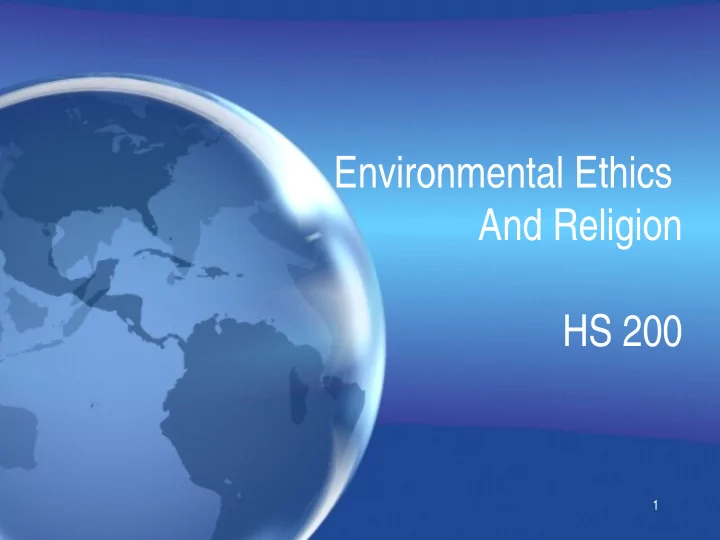

Environmental Ethics And Religion HS 200 1
2
Overview • Define Environmental Ethics & Sustainability • What is Ethics? • Relation between religion and environment • Scripture references & environment • Current events • How you can make a difference 3
• Environmental Ethics: • Anthropocentrism vs. Nonanthropocentrism • Animal vs. Environmental Ethics • Nonathropocentrism • A Pragmatist Alternative 4
What is Environmental Ethics? • Environmental ethics- the discipline that studies the moral relationship of human beings and also the value and moral status of the environment and its nonhuman contents • It considers the ethical relationship between humans and the environment 5
Why are Environmental Ethics Important? • Humans are slowly depleting all of our natural resources that other generations need for their future • Our world was created for us to live and thrive on and we are slowly killing it • Sustainability for the environment is crucial so that we do not destruct the world that God created 6
What is Ethics? • The scope of ethics is much broader than the realm of law. Ethics extends to all our duties and obligations, virtues and vices, as we interact with each other – whether or not we should lie or steal, whether we should be charitable toward those less fortunate than ourselves, whether we should be forgiving, and how to resolve conflicts of interest when we have conflicting obligations to different persons. • The general study of goodness. • The general study of right action. • Metaethics • Applied ethics 7
The general study of goodness. • Minimally, two questions: • (1) What are the components of a good life? • (2) What sort of things are good in themselves? • Raises the issue of intrinsic value vs. instrumental value: • Intrinsic value: The worth objects have in their own right, independent of their value to any other end. • Instrumental value: The worth objects have in fulfilling other ends. 8
The general study of right action. • The principles of right and wrong that govern our choices and pursuits. And Can be understood collectively to constitute a moral code which define the responsibilities of people who live together. • Deontological Ethics (Kant’s categorical imperative) • Consequentialist Ethics (Mill’s utilitarianism) • Virtue Ethics (Aristotle) • Attempts in all three schools to tie moral obligation to something like a claim to intrinsic value. 9
Deontological Ethics • What is deontology? • The word ‘deontology’ derives from Greek words Deno means duty and Logos means study. • Deontological ethics or deontology is an approach to ethics that determines goodness or rightness from examining acts, rather than the consequences of the that act • Deontologists look at rules and duties. 10
Consequentialist Ethics • Consequentialism, as its name suggests, is the view that normative properties depend only on consequences. • Which holds that whether an act is morally right depends only on the consequences of that act or of something related to that act 11
Virtue Ethics • Virtue theory is an approach to ethics which emphasizes the character of the moral agent, rather than rules or consequences, as the key element of ethical thinking. • Being virtue is not a habit or tendency • It is a intuitive character 12
Metaethics • Metaethics is the attempt to understand the metaphysical, epistemological, semantic, and psychological, presuppositions and commitments of moral thought, talk, and practice. • It counts within its domain a broad range of questions and puzzles. The metaethical questions are follows: 13
• Is morality more a matter of taste than truth? • Are moral standards culturally relative? Are there moral facts? • If there are moral facts, what is their origin? • How is it that they set an appropriate standard for our behavior? • How might moral facts be related to other facts (about psychology, happiness, human conventions…)? • And how do we learn about the moral facts, if there are any? 14
Moral Actions • A moral action is either called good or bad. • Voluntary actions, Chosen, Freedom. Non-Moral Actions • A non-moral action is neither called good nor bad. • For Example, hurricane, flood, drought etc. are not included in moral actions • Children's actions and mad man’s actions Amoral actions 15
How are ethics and law related? Illegal & Ethical Ethical & Legal Illegal & Unethical Legal & Unethical 16
Developing a Well-Reasoned Response to a Moral Dilemma • Moral dilemmas are situations in which two or more moral obligations, duties, rights, goods, or ideals come into conflict with one another. • How does one decide whether a response is well- reasoned? What criteria apply? Can we reliably judge? 17
Recommend
More recommend